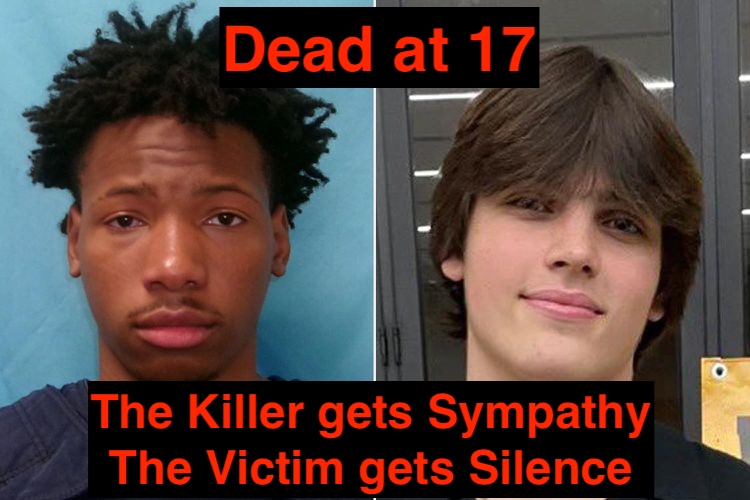On April 2, 2025, a tragedy unfolded at a high school track meet in Frisco, Texas. Austin Metcalf, a 17-year-old white student-athlete from Memorial High School, was stabbed in the heart and died in the arms of his twin brother. The alleged attacker? Karmelo Anthony, a 17-year-old Black student from a rival school.
Police reports say the violence began when Metcalf asked Anthony to leave a team tent. Anthony refused. Tensions rose. Witnesses say Anthony warned Metcalf not to touch him. When Metcalf tried to move him, Anthony pulled a knife from his backpack and stabbed him in the chest. Metcalf collapsed and died within minutes.
This wasn’t a schoolyard fight gone wrong. It was a murder. But instead of a national outcry, we’re seeing a narrative shift—and not in the victim’s favor.
Austin’s parents are shattered. His classmates are traumatized. But the national conversation? It’s focused on the accused. Fundraisers for Anthony are gaining traction. Social media voices are calling it self-defense. Pundits are framing it as a reaction to “harmful speech” or “lived experience.” And the media coverage? Muted at best.
Let’s be honest: If the roles were reversed—if a white student had stabbed a Black teen—you’d be seeing wall-to-wall coverage, headlines calling it a hate crime, protests in the streets, and calls for justice from the highest offices in the country.
But not this time. This time, the script is being flipped. The aggressor is being cast as the victim. Violence is being excused. And the young man who lost his life? Treated as a footnote.
That’s not justice. That’s narrative management.
The idea that words are violence—and therefore violence is sometimes justified in response—isn’t just dangerous. It’s delusional. Asking someone to leave a tent, or even physically moving someone without injury, is not a reason to kill. That’s true in every court in America.
And yet, this mindset—that emotional discomfort excuses physical aggression—is spreading fast. Under the banner of “equity” and “oppression,” some now argue that accountability should depend on identity. That the rules don’t apply equally. That some lives are worth more than others.
This is how you destroy a justice system.
Let’s call this what it is: A young man was stabbed to death in front of his teammates. His brother held him as he died. And instead of outrage, we get excuses.
Why?
Because too many people have been conditioned to believe that justice should be filtered through the lens of race, history, and grievance. That some actions—however violent—are justified by the pain of the past.
But justice cannot be subjective. It must be equal. Or it’s not justice at all.
Look at the pattern. When white individuals are accused—whether it’s Daniel Penny, Kyle Rittenhouse, Nick Sandmann, or even Border Patrol agents falsely accused of “whipping” migrants—the condemnation is immediate. Guilt is assumed. Careers are ruined. Lives destroyed before the facts come out.
Now compare that to this case.
Austin Metcalf is dead. He didn’t throw a punch. He didn’t have a weapon. He was 17, a student at a school sporting event. And yet, the spotlight has shifted away from his death—to the feelings of the person who killed him.
To the students who watched this horror unfold, what message are we sending? That justice depends on who you are? That some violence is more acceptable than others?
To Hunter Metcalf, who held his twin as he died, what kind of society are we offering?
This isn’t about vengeance. It’s about accountability. About making it clear that murder will never be tolerated—regardless of who commits it or why. If we don’t make that clear now, when will we?
Justice doesn’t care about identity. It cares about actions.
We owe it to Austin. We owe it to every student who witnessed that nightmare. And we owe it to the principle that no life is above the law—and no death beneath our attention.

Leave a Reply